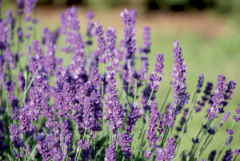Lavender and multiple sclerosis

Fatigue is one of the most common symptoms associated with multiple sclerosis (MS), affecting almost 80% of patients. It can have a major impact on the patient’s quality of life, with 55% reporting it as one of the worst symptoms experienced, often independently of the level of disability. Fatigue in autoimmune conditions is also of course multifaceted and complex.
Lavender is one of the plants traditionally used for the treatment of neurological conditions and various lavender species are used in medicine. Studies have reported analgesic, anti-seizure, anti-inflammatory, and benefits have been reported for it in the treatment of fatigue in hemodialysis patients and in postpartum women. It has also been used with success to improve working memory, as well as fatigue, in patients with MS.
Based upon this and its known pharmacology, researchers decided to investigate the effects of lavender flowers (Lavandula angustifolia) on symptoms of fatigue in MS patients.
Clinical trial
Of 265 MS patients registered at a neurological disease research centre that were evaluated, 48 eligible patients were selected. Participants had to not be suffering from a plethora of other diseases that can cause fatigue, such as heart disease, liver disease, kidney disease, respiratory disease, other autoimmune diseases or hypothyroidism, and not suffering from depression or taking antidepressants and anticonvulsants. All were 18 years or older, and suffering from moderate to severe fatigue.
Patients were randomised to take capsules containing either 600 mg dried lavender flowers or cornstarch, three times daily for 60 days. They were followed up by phone every week and at the end of the 30 and 60 days in person, to confirm compliance and report any adverse events. A Modified Fatigue Impact Scale (MFIS) was used to assess the patient’s fatigue. This contained items to evaluate physical, cognitive and psychosocial subscales.
Results
Assessments made after 60 days of treatment measured a significant reduction in fatigue scores following lavender treatment. As a result, the mean total MFIS score in the intervention group was 7.04, while in the control group it was 38.17.
The authors cited results from similar studies into three months treatment with either evening primrose oil or Korean ginseng for fatigue in MS patients, which reported benefits but less so than those in the lavender study.
